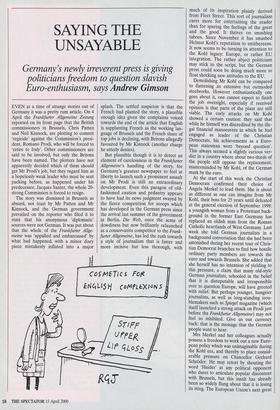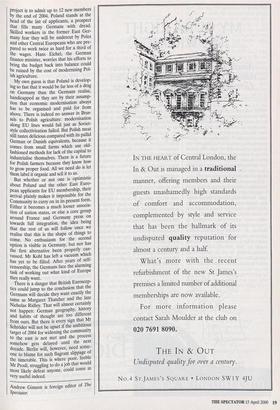SAYING THE UNSAYABLE
Germany's newly irreverent press is giving politicians freedom to question slavish
Euro-enthusiasm, says Andrew Gimson EVEN at a time of strange stories out of Germany it was a pretty rum article. On 4 April the Frankfurter Allgemeine Zeitung reported on its front page that the British commissioners in Brussels, Chris Patten and Neil ICinnock, are plotting to commit 'regicide' against the Commission's presi- dent, Romano Prodi, who will be forced to 'retire to Italy'. Other commissioners are said to be involved, but only the Britons have been named. The plotters have not apparently decided which of them should get Mr Prodi's job, but they regard him as a hopelessly weak leader who must be sent packing before, as happened under his predecessor, Jacques Santer, the whole 20- strong Commission is forced to resign.
The story was dismissed in Brussels as absurd, not least by Mr Patten and Mr ICinnock, and the German government prevailed on the reporter who filed it to state that his anonymous 'diplomatic' sources were not German. It was put about that the whole of the Frankfurter Allge- meine was 'appalled and embarrassed' by what had happened, with a minor diary piece mistakenly inflated into a major splash. The settled suspicion is that the French had planted the story, a plausible enough idea given the complaints voiced towards the end of the article that English is supplanting French as the working lan- guage of Brussels and the French share of top jobs is declining, with Britons allegedly favoured by Mr ICinnock (another charge he utterly denies).
But plausible though it is to detect an element of carelessness in the Frankfurter Allgemeine's handling of the story, for Germany's greatest newspaper to feel at liberty to launch such a prominent assault on Mr Prodi is still an extraordinary development. Even this paragon of old- fashioned caution and pedantry appears to have had its news judgment swayed by the fierce competition for scoops which has developed in the German press since the arrival last summer of the government in Berlin. Die Welt, once the acme of dowdiness but now brilliantly relaunched as a conservative competitor to the Frank- furter Allgemeine, has led the rush towards a style of journalism that is faster and more incisive but less thorough, with much of its inspiration plainly derived from Fleet Street. This sort of journalism cares more for entertaining the reader than for sparing the feelings of the great and the good. It thrives on smashing taboos. Since November it has smashed Helmut Kohl's reputation to smithereens. It now seems to be turning its attention to the Kohl legacy: Europe, or rather EU integration. The rather abject politicians may stick to the script, but the German press could soon be doing much more to float shocking new attitudes to the EU.
Demolishing Mr Kohl can be compared to flattening an extensive but outmoded steelworks. However enthusiastically one goes about it, one cannot expect to finish the job overnight, especially if received opinion is that parts of the plant are still viable. The early attacks on Mr Kohl showed a certain caution: they said that while he himself was discredited by the ille- gal financial manoeuvres in which he had engaged as leader of the Christian Democrats, his achievements as a Euro- pean statesman were 'beyond question'. This always seemed a slightly curious ver- dict in a country where about two-thirds of the people still oppose the replacement, masterminded by Mr Kohl, of the German mark by the euro.
At the start of this week the Christian Democrats confirmed their choice of Angela Merkel to lead them. She is about as different as one can imagine from Mr Kohl, their boss for 25 years until defeated at the general election of September 1998: a youngish woman from a Protestant back- ground in the former East Germany has replaced an oldish man from the Roman Catholic heartlands of West Germany. Last week she told German journalists in a background conversation that she had been astonished during her recent tour of Chris- tian Democrat branches to find how hostile ordinary party members are towards the euro and towards Brussels. She added that she herself has no intention of yielding to this pressure, a claim that many old-style German journalists, schooled in the belief that it is disreputable and irresponsible ever to question Europe, will have greeted with relief. But perhaps younger, hungrier journalists, as well as long-standing trou- blemakers such as Spiegel magazine (which itself launched a strong attack on Prodi just before the Frankfurter Allgerneine) may not feel so inhibited. Give us our currency back: that is the message that the German people want to hear.
Mrs Merkel and her colleagues actually possess a freedom to work out a new Euro- pean policy which was unimaginable during the Kohl era, and thereby to place consid- erable pressure on Chancellor Gerhard Schroder. He may retort by shouting the word 'Haider' at any political opponent who dares to articulate popular discontent with Brussels, but this insult has already been so widely flung about that it is losing its sting. The European Union's next great project is to admit up to 12 new members by the end of 2004. Poland stands at the head of the list of applicants, a prospect that fills many Germans with dread. Skilled workers in the former East Ger- many fear they will be undercut by Poles and other Central Europeans who are pre- pared to work twice as hard for a third of the wages. Hans Eichel, the German finance minister, worries that his efforts to bring the budget back into balance could be ruined by the cost of modernising Pol- ish agriculture.
My own guess is that Poland is develop- ing so fast that it would be far less of a drag on Germany than the Germans realise, handicapped as they are by their assump- tion that economic modernisation always has to be organised and paid for from above. There is indeed no answer in Brus- sels to Polish agriculture: modernisation along EU lines would fail just as Soviet- style collectivisation failed. But Polish meat still tastes delicious compared with its pallid German or Danish equivalents, because it Comes from small farms which use old- fashioned methods for lack of the capital to industrialise themselves. There is a future for Polish farmers because they know how to grow proper food. All we need do is let them label it organic and sell it to us. But whether or not one is optimistic about Poland and the other East Euro- pean applicants for EU membership, their arrival plainly makes it impossible for the Community to carry on in its present form. Either it becomes a much looser associa- tion of nation states, or else a core group around France and Germany press on towards full integration, the idea being that the rest of us will follow once we realise that this is the shape of things to come. No enthusiasm for the second Option is visible in Germany, but nor has the first alternative been properly can- vassed. Mr Kohl has left a vacuum which has yet to be filled. After years of self- censorship, the Germans face the alarming task of working out what kind of Europe they really want.
There is a danger that British Euroscep- tics could jump to the conclusion that the Germans will decide they want exactly the same as Margaret Thatcher and the late Nicholas Ridley. That will almost certainly not happen: German geography, history and habits of thought are too different from ours. But there is every sign that Mr Schr6der will not be upset if the ambitious target of 2004 for widening the community to the east is not met and the process somehow gets delayed until the next decade. Berlin will, however, need some- one to blame for such flagrant slippage of the timetable. This is where poor, feeble Mr Prodi, struggling to do a job that would most likely defeat anyone, could come in very useful indeed.
Andrew Gimson is foreign editor of The Spectator.



































































 Previous page
Previous page